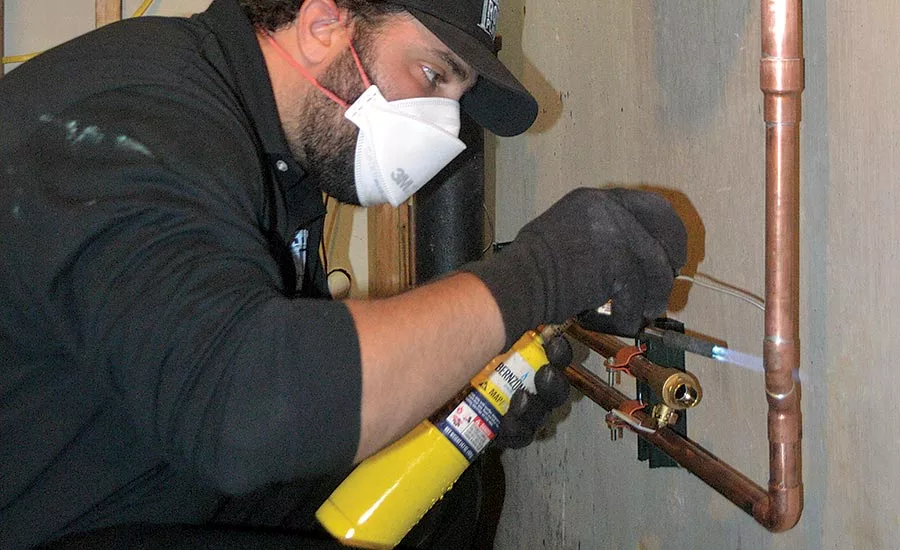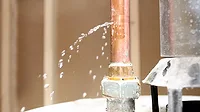Recommending the right flow-based leak control technology for the job
Help clients meet their needs, and let your business benefit.

Water damage from plumbing leaks accounts for an estimated $13 billion annually across the industry. And while leaks will never stop forming, flow-based technologies offer a solution to see and stop them automatically, minimizing property damage.

Noah Klein, owner of Southfield, Michigan-based Royal Plumbing, discusses the benefits of leak detection systems, such as FloLogic.
Plumbing contractors across the country are receiving more calls than ever before from prospective customers who are looking to have a flow-based smart leak control system installed in their home or business. These clients know they want (or need) a system, and may even have a specific brand in mind. But most look for the endorsement of the plumbing contractor before they commit. And in addition to an installation estimate, they likely need some expert advice to ensure they’re picking the right system for their property.
To best seize these opportunities, it’s important to have a general understanding of the technologies that are available today and to recognize the key motivations for the client, so you can recommend the best solution.
War on water damage
Let’s discuss client motivations first. The newfound customer demand for flow-based leak detection devices is driven primarily by the insurance industry. Water damage from plumbing leaks accounts for almost half of property claim dollars for some insurers, and an estimated $13 billion annually across the industry. Water damage is a problem that’s compounded by aging plumbing infrastructures. And while leaks will never stop forming, technologies now allow us to see and stop them automatically with great accuracy.
Armed with the fact that a primary area of risk can be virtually eliminated, insurers have a strategy to wage war on water damage. Many insurance carriers are now requiring a flow-based leak control device before they agree to write or renew certain policies. And even if they’re not requiring one, insurance providers are beginning to recommend them with the promise of discounts that equal hundreds or thousands of dollars in savings each year on insurance premiums, all for simply installing a device. The justification to invest in smart leak control is clearly there.
Customers who are not prompted by insurance are motivated by the protection and energy savings benefits of a smart leak control device as part of their smart-home ecosystem. While they already enjoy home surveillance and climate controls, adding smart plumbing system surveillance and control is a logical next step.
Choosing the right technology
Now to installing the right solution. Today, there are a growing list of leak detection technologies available within a variety of price ranges. With price differences come variances in available pipe sizes, component materials and detection features. It can get confusing to customers, so many will need your expertise on which technology is best for them. To recommend and install the right system for your client, and to ensure it’s a profitable business endeavor, you can assess the prospective installation with three basic questions.
Why are they buying?
Understand what type of prospective customer you have. Is the client primarily focused on reducing their water consumption as part of monitoring gallons-per-day of usage? Is it all about the money where they want an insurance discount on a typical home, while investing the least amount possible? Either of these customers may be a candidate for one of the meter-equipped technologies sold in many places, such as big box retailers, that, while sometimes limiting for larger properties, offer advanced water usage data insights and good levels of property protection.
Many homeowners come into the smart leak control category with a laser focus on protecting their property. Oftentimes the client may have the mandate of their insurer to install a specified brand, or one brand among a short list of vetted options. These protection-focused clients often have larger, more complex properties. For them, one of the upper-tier leak control devices — one that goes beyond metering technology to focus on seeing virtually any-sized leak in real-time — may be the go-to recommendation that will best satisfy their needs.
What type of property is it?
Is the water supply accessible in a basement, crawl space or garage, or is the property constructed on a slab where the supply is only accessible outside? How big is the supply pipe? Are there devices that automatically use large amounts of water, such as irrigation systems, pools and water softeners? All of these factors will dictate which device will be the best candidate for the prospective installation. Not all technologies are compatible with outside installations. And not all brands are available in larger pipe sizes. Some basic research will give you an understanding of how to classify the systems that are available, so you can recommend one that works for the job at hand.
How does the installation fit my business?
The concept of a smart-home device may seem daunting enough for some plumbers to discount themselves and not consider taking on smart leak control device sales and installations. Don’t fall for the stigma and fall behind other plumbers in your market! Instead, be assured that any licensed plumber has the skills required to install a device. In the end, you are installing a valve in a pipe. Sometimes, basic integrations or power source additions need to be made, and if they become advanced, simply bring in an electrician to handle the wiring. Connecting devices to the home Wi-Fi network for app-based controls can typically be left up to the property owner or manager.
Here’s the bottom line: Not only will you profit from smart leak control installation services, many devices offer plumber-exclusive trade discounts that add up to even more revenue for selling the product you recommend and install. As the smart leak control category grows, plumbers are the ultimate gatekeepers to help customers get the device that meets their needs. And thankfully, with some demystifying and basic understanding, these transactions will be smooth ones that are good for the businesses of plumbing professionals everywhere.
Looking for a reprint of this article?
From high-res PDFs to custom plaques, order your copy today!









